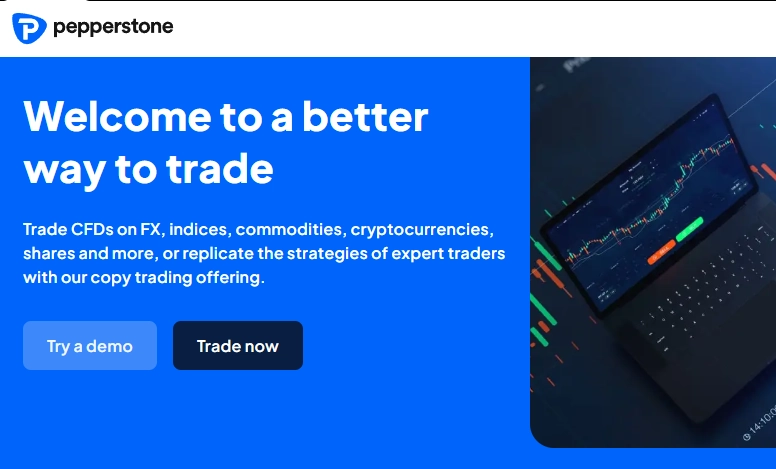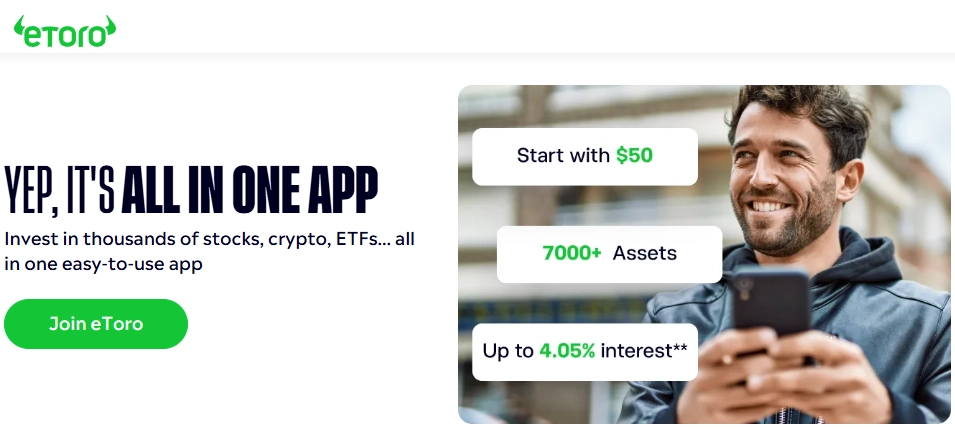TOP 2025 regulated broker reviews for CFD trading
Best CFD Brokers of 2025: Your Complete Guide to Regulated Trading Platforms
Finding the best CFD broker in 2025 requires careful consideration of regulation, trading costs, platform functionality, and overall reliability. The CFD trading landscape has evolved significantly, with stricter regulatory oversight and enhanced trader protections becoming standard across reputable platforms.
Our comprehensive analysis reveals the top-performing brokers that combine competitive spreads, robust regulatory compliance, and superior trading infrastructure. Each broker on this list maintains proper licensing from recognized financial authorities, ensuring your funds remain protected. Rest assured, none of the brokers featured in our selection are scams – all have established track records and maintain transparent operations.
The following five brokers represent the cream of the crop for 2025, offering diverse trading opportunities across global markets while maintaining the highest standards of regulatory compliance and customer service.
FP Markets: Premium Multi-Asset Trading
https://i.postimg.cc/g2YBr9ks/fp-markets-broker.webp
Alt-текст: FP Markets broker.
FP Markets stands out as a comprehensive trading solution, offering access to over 10,000 underlying assets across multiple market categories. This Australian-regulated broker has built a solid reputation through consistent execution quality and competitive pricing structures.
Key Features:
- ASIC and CySEC regulation provides dual-layer protection
- Raw ECN account offers institutional-grade spreads
- Advanced MetaTrader and cTrader platform integration
- 24/7 multilingual customer support
Pros:
- Extensive asset selection covering forex, indices, commodities, and cryptocurrencies
- Tight spreads starting from 0.0 pips on major currency pairs
- No deposit or withdrawal fees on most payment methods
- Professional research tools and market analysis
- Educational resources for beginner and intermediate traders
Cons:
- Higher minimum deposit compared to some competitors
- Limited social trading features
- Some advanced features require professional account status
Minimum Deposit: $100
Pepperstone: Raw Spread Excellence

Pepperstone has established itself as a premier choice for serious CFD traders seeking institutional-quality execution and razor-sharp pricing. The Australian broker's commitment to providing raw market access with minimal markup has earned recognition among professional traders worldwide.
Key Features:
- ASIC and FCA regulation with tier-one oversight
- Raw spread accounts with ECN connectivity
- MetaTrader and cTrader platform integration
- Social trading through Myfxbook AutoTrade
Pros:
- Ultra-tight spreads starting from 0.0 pips on major pairs
- Fast execution speeds with minimal slippage
- No dealing desk intervention on trades
- Comprehensive range of 1,200 instruments
- Professional-grade infrastructure
- 24/7 multilingual customer support
Cons:
- Commission-based pricing may not suit all trading styles
- Higher minimum deposit than ultra-low barrier brokers
- Limited educational content compared to some competitors
Minimum Deposit: $200
M4Markets: Rising Star with Competitive Edge

M4Markets Regulated Broker has rapidly established itself as a formidable player in the CFD trading space, combining cutting-edge technology with trader-focused features. The broker's commitment to providing institutional-quality services to retail traders sets it apart from traditional offerings.
Key Features:
- Multiple regulatory licenses including ASIC and FSA
- MetaTrader 4 and 5 platforms with custom tools
- Dedicated account managers for premium clients
- Advanced risk management tools
Pros:
- Competitive spreads across all major asset classes
- No commission trading on most instruments
- Comprehensive educational program including webinars and tutorials
- Fast deposit and withdrawal processing
- Professional-grade charting and analysis tools
- Strong focus on customer service excellence
Cons:
- Relatively newer brand with shorter market history
- Limited cryptocurrency CFD options
- Higher minimum deposit than some ultra-low barrier competitors
Minimum Deposit: $250
Saxo Bank: Institutional-Grade Platform

Saxo Bank brings decades of institutional trading expertise to the retail CFD market. This Danish investment bank offers unparalleled access to global markets through sophisticated trading technology and comprehensive research capabilities.
Key Features:
- Full banking license and multiple regulatory authorizations
- Proprietary SaxoTraderGO and SaxoTraderPRO platforms
- Access to 36,000 tradeable instruments
- Advanced portfolio management tools
Pros:
- Exceptional research and analysis resources
- Direct market access with transparent pricing
- Professional-grade risk management features
- Comprehensive educational academy
- Strong focus on regulatory compliance and client protection
Cons:
- High minimum deposit requirement
- Complex fee structure may confuse beginners
- Platform may be overwhelming for casual traders
- Limited social trading features
Minimum Deposit: $10,000
eToro: Social Trading Pioneer

eToro revolutionized retail trading by introducing social trading concepts that allow users to copy successful traders' strategies. The platform combines traditional CFD trading with innovative social features, making it particularly appealing to newcomers.
Key Features:
- CySEC and FCA regulation across multiple jurisdictions
- Proprietary trading platform with social integration
- CopyTrader technology for strategy replication
- Comprehensive mobile applications
Pros:
- Ultra-low minimum deposit of just $10
- User-friendly interface designed for beginners
- Extensive social community
- Commission-free stock CFDs
- Strong educational content and market insights
- Wide range of payment methods
Cons:
- Limited advanced charting tools
- Higher spreads on some instruments
- Weekend trading fees on certain positions
- Withdrawal fees apply to most methods
Minimum Deposit: $10
Compare Top CFD Brokers
|
CFD Broker |
Range of Underlying Assets |
Min Deposit |
Min Contract Size |
Max Leverage (Retail) |
Max Leverage (Pro) |
|
M4Markets |
1,000 |
$250 |
0.01 lots |
1:30 |
1:500 |
|
FP Markets |
10,000 |
$100 |
0.01 lots |
1:30 |
1:500 |
|
Exness |
200 |
$1 |
0.01 lots |
1:30 |
1:2000 |
|
Saxo Bank |
36,000 |
$10,000 |
1 share/unit |
1:30 |
1:100 |
|
eToro |
2,000 |
$10 |
1 share/unit |
1:30 |
1:400 |
Choosing the Right Broker: Key Factors to Consider
Selecting the best broker for 2025 requires evaluating multiple criteria that directly impact your trading experience and potential profitability. The following factors should guide your decision-making process.
1. Regulation and Trustworthiness
Regulatory oversight serves as your primary protection against broker misconduct and ensures proper handling of client funds. Regulated CFD brokers must adhere to strict capital requirements, segregate client deposits, and participate in compensation schemes that protect traders in case of broker insolvency.
Look for brokers licensed by tier-one regulators such as the Financial Conduct Authority (FCA) in the UK, the Australian Securities and Investments Commission (ASIC), or the Cyprus Securities and Exchange Commission (CySEC). These authorities maintain rigorous oversight standards and require regular financial reporting.
Additionally, verify that your chosen broker participates in relevant compensation schemes. For example, FCA-regulated firms contribute to the Financial Services Compensation Scheme (FSCS), which may provide up to £85,000 in protection per client.
2. Trading Costs and Fees
Understanding the complete cost structure is crucial for long-term profitability. Top CFD trading platforms employ various fee models, and the most suitable option depends on your trading style and frequency.
Spread-only brokers charge no commissions but typically offer wider bid-ask spreads. This model often suits infrequent traders or those preferring simplicity. Conversely, commission-based models feature tighter spreads but charge fixed fees per trade, potentially benefiting high-frequency traders.
Consider these additional costs:
- Overnight financing charges for positions held beyond one trading day
- Currency conversion fees for deposits, withdrawals, or trading in foreign-denominated instruments
- Inactivity fees charged during extended periods of account dormancy
- Withdrawal fees that may vary by payment method
3. Available Instruments
Modern CFD brokers offer access to thousands of underlying assets across multiple markets. Your broker should provide adequate coverage of your preferred trading instruments, whether you focus on forex pairs, stock indices, individual equities, commodities, or cryptocurrency CFDs.
Market depth also matters significantly. Premium brokers often provide access to exotic currency pairs, small-cap stocks, and niche commodity markets that may offer unique trading opportunities. However, ensure sufficient liquidity exists in your chosen instruments to avoid excessive slippage during order execution.
4. Trading Platforms
Platform functionality directly impacts your ability to analyze markets, execute trades efficiently, and manage risk effectively. Most reputable brokers offer MetaTrader 4 or 5, which provide comprehensive charting tools, automated trading capabilities through Expert Advisors, and extensive customization options.
Proprietary platforms may offer unique features such as advanced order types, integrated research tools, or social trading capabilities. Evaluate platform stability, execution speed, and mobile accessibility to ensure consistent performance across all your devices.
5. Customer Support
Reliable customer support becomes crucial when technical issues arise or you need assistance with account-related matters. Quality brokers provide multiple communication channels including live chat, telephone support, and email assistance.
Consider support availability in your timezone and preferred language. Some brokers offer 24/7 multilingual support, while others operate during standard business hours. Response quality matters as much as availability – knowledgeable representatives should resolve issues efficiently without unnecessary delays.
6. Deposit and Withdrawal Process
Efficient fund management enhances your overall trading experience and provides confidence in your broker's operational capabilities. Leading CFD brokers support multiple payment methods including bank transfers, credit cards, e-wallets, and increasingly, cryptocurrency deposits.
Processing times vary significantly between methods and brokers. While e-wallet deposits often process instantly, bank transfers may require several business days. Withdrawal processing deserves particular attention, as delays in accessing your funds can indicate operational problems or regulatory issues.
Verify minimum and maximum transaction limits align with your trading capital requirements. Some brokers impose fees on deposits or withdrawals, which can erode profitability over time, particularly for smaller accounts or frequent transactions.

